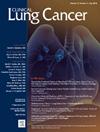自体造血干细胞移植支持的剂量强化化疗与阿德来单抗作为广泛期小细胞肺癌一线治疗的I期临床试验
IF 3.3
3区 医学
Q2 ONCOLOGY
引用次数: 0
摘要
背景:小细胞肺癌(SCLC)最初对化疗高度敏感,化疗往往导致肿瘤显著缩小。然而,大多数患者最终出现耐药性,且肿瘤微环境“冷”,肿瘤免疫原性低,CD8+ T细胞浸润有限,使疾病进一步复杂化。这些因素导致了许多广泛期SCLC (ES-SCLC)对免疫治疗的不良反应。高剂量化疗已显示出增强肿瘤细胞减少的潜力,但其使用往往受到严重血液学毒性的限制。化疗联合免疫检查点抑制剂(ICIs)可通过促进免疫原性细胞死亡和增强免疫激活产生协同效应。自体造血干细胞移植(auto-HSCT)提供了一种支持造血恢复、减轻化疗诱导的骨髓抑制和促进免疫重建的手段。在这种背景下,自体造血干细胞移植与剂量强化化疗和ICIs的结合旨在保护骨髓和增强抗肿瘤免疫反应,潜在地克服ES-SCLC对免疫治疗的耐药性。方法:一项I期、单中心、单臂试验旨在评估自体造血干细胞支持的剂量强化化疗联合阿布雷单抗治疗初治ES-SCLC患者的安全性和有效性。参与者将接受诱导化疗,然后进行干细胞动员、分离和冷冻保存。成功动员后,将进行干细胞回输和粒细胞集落刺激因子(G-CSF)支持的巩固化疗。阿布来单抗维持治疗持续到疾病进展或不可接受的毒性。将分析安全性和有效性数据,包括不良事件、客观缓解率(ORR)、无进展生存期(PFS)和总生存期(OS)。结果:本研究旨在通过克服免疫化疗耐药和促进免疫重建来提高治疗效果。该试验正在广州医科大学第一附属医院进行。试验注册:ClinicalTrials.gov标识符:NCT06597513。本文章由计算机程序翻译,如有差异,请以英文原文为准。
Phase I Clinical Trial of Autologous Hematopoietic Stem Cell Transplantation-Supported Dose-Intensified Chemotherapy With Adebrelimab as First-Line Treatment for Extensive-Stage Small Cell Lung Cancer
Background
Small cell lung cancer (SCLC) is initially highly sensitive to chemotherapy, which often leads to significant tumor reduction. However, the majority of patients eventually develop resistance, and the disease is further complicated by its “cold” tumor microenvironment, characterized by low tumor immunogenicity and limited CD8+ T cell infiltration. These factors contribute to the poor response to immunotherapy in many cases of extensive-stage SCLC (ES-SCLC). High-dose chemotherapy has shown potential in enhancing tumor cytoreduction, but its use is often limited by severe hematologic toxicity. Combining chemotherapy with immune checkpoint inhibitors (ICIs) can create a synergistic effect by promoting immunogenic cell death and enhancing immune activation. Autologous hematopoietic stem cell transplantation (auto-HSCT) provides a means to support hematopoietic recovery, mitigate chemotherapy-induced myelosuppression, and contribute to immune reconstitution. In this context, the integration of auto-HSCT with dose-intensified chemotherapy and ICIs aims to both protect the bone marrow and enhance antitumor immune responses, potentially overcoming resistance to immunotherapy in ES-SCLC.
Methods
A phase I, single-center, single-arm trial was designed to evaluate the safety and efficacy of auto-HSCT-supported dose-intensified chemotherapy combined with adebrelimab in treatment-naive ES-SCLC patients. Participants will receive induction chemotherapy followed by stem cell mobilization, apheresis, and cryopreservation. After successful mobilization, consolidation chemotherapy with stem cell reinfusion and granulocyte colony-stimulating factor (G-CSF) support will be performed. Maintenance therapy with adebrelimab continues until disease progression or unacceptable toxicity. Safety and efficacy data, including adverse events, objective response rate (ORR), progression-free survival (PFS), and overall survival (OS), will be analyzed.
Results
The study aims to enhance treatment outcomes by overcoming resistance to immuno-chemotherapy and promoting immune reconstitution. The trial is ongoing at the First Affiliated Hospital of Guangzhou Medical University.
Trial Registration
ClinicalTrials.gov Identifier: NCT06597513.
求助全文
通过发布文献求助,成功后即可免费获取论文全文。
去求助
来源期刊

Clinical lung cancer
医学-肿瘤学
CiteScore
7.00
自引率
2.80%
发文量
159
审稿时长
24 days
期刊介绍:
Clinical Lung Cancer is a peer-reviewed bimonthly journal that publishes original articles describing various aspects of clinical and translational research of lung cancer. Clinical Lung Cancer is devoted to articles on detection, diagnosis, prevention, and treatment of lung cancer. The main emphasis is on recent scientific developments in all areas related to lung cancer. Specific areas of interest include clinical research and mechanistic approaches; drug sensitivity and resistance; gene and antisense therapy; pathology, markers, and prognostic indicators; chemoprevention strategies; multimodality therapy; and integration of various approaches.
 求助内容:
求助内容: 应助结果提醒方式:
应助结果提醒方式:


